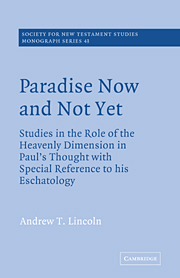 Paradise Now and Not Yet
Paradise Now and Not Yet Book contents
- Frontmatter
- Contents
- Preface
- Abbreviations and note on the text
- Introduction
- 1 Galatians and the heavenly Jerusalem
- 2 1 Corinthians and heavenly existence
- 3 2 Corinthians, the heavenly house and the third heaven
- 4 Philippians and the heavenly commonwealth
- 5 Colossians and heavenly-mindedness
- 6 Ephesians and heavenly life in the Church at worship
- 7 Heaven and the eschatological perspective in Pauline thought
- Notes
- Bibliography
- Index
5 - Colossians and heavenly-mindedness
Published online by Cambridge University Press: 03 November 2009
- Frontmatter
- Contents
- Preface
- Abbreviations and note on the text
- Introduction
- 1 Galatians and the heavenly Jerusalem
- 2 1 Corinthians and heavenly existence
- 3 2 Corinthians, the heavenly house and the third heaven
- 4 Philippians and the heavenly commonwealth
- 5 Colossians and heavenly-mindedness
- 6 Ephesians and heavenly life in the Church at worship
- 7 Heaven and the eschatological perspective in Pauline thought
- Notes
- Bibliography
- Index
Summary
Our general discussion of Paul's treatment of the heavenly dimension in Colossians leads up to a more detailed examination of the pericope, Colossians 3: 1–4. Unlike the hymn in Colossians 1: 15–20, this passage has the advantage of not being overworked in recent scholarship. The term τὰ ἄνω, which is an equivalent to the heavenly dimension, figures prominently in this passage, and the passage itself is crucial to the structure of the letter as a whole as it provides a bridge from the polemic of chapter 2 into the second half of the letter with its ethical parenesis. Its pivotal place in the letter reflects the centrality of the heavenly realm to the problems in Colossae with which Paul deals.
False teaching about the heavenly world in Colossae
There was no lack of interest in the heavenly dimension in Colossae and the form this interest took conditions to a large degree Paul's response and its terminology. It is however not easy to be precise about the form the interest took. Epaphras evidently felt there was cause for some concern at the ailment which was beginning to plague the church and on hearing his report Paul shared this concern and set about prescribing what he knew to be the only cure. Although the prescription for cure comes across reasonably clearly to the present-day reader of Colossians, the ailment defies a really detailed diagnosis on his part.
- Type
- Chapter
- Information
- Paradise Now and Not YetStudies in the Role of the Heavenly Dimension in Paul's Thought with Special Reference to his Eschatology, pp. 110 - 134Publisher: Cambridge University PressPrint publication year: 1981


